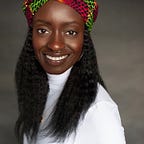Finding Privilege in Black Skin
Cynthia Erivo, stunning and talented Nigerian-British actress was the only actor nominated for an Oscar in 2020 who was not white. It reminded me of the interview I did in 2018 in the Philly inquirer about the tension between Black Americans and Black immigrants when Ms. Erivo she was chosen to play Harriet Tubman. Social media went nuts. There was even a Change.org petition to demand a Black American be cast in the role, and threats of boycotting the role ensued.
I felt I knew immediately what was going on.
Growing up in an almost all-white town where microaggressions and racism are part of everyday life, I learned how to cope as best as I could. Unfortunately, it wasn’t healthy. Somewhere along the line, I took notice that white people were interested in my heritage. They would tell me I was different from other Black people. I was told I didn’t quite look like them or speak like them. When I was younger, I thought the hundreds of years of exposure on the American continent, the weather and the food had change their look. (It wasn’t until my 20’s that I realized one major reason Black Americans and Africans look so different today is because of rampant rape that took place during slavery.) When I explained that my parents were from Ghana and I was African, I noticed an immediate shift — a shift of intrigue. So going forward, when I encountered a white person whose vibes were off-standish and I couldn’t figure out if it was my strong personality or my skin color that was the barrier, I would do a sociological experiment: I would…
